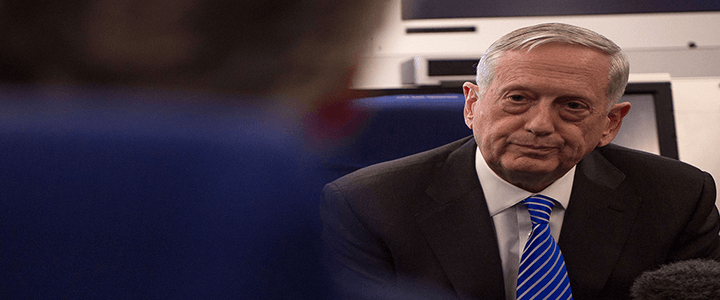American service members have another reason to love Secretary of Defense James Mattis. As if the troops needed another reason to love Secretary of Defense James Mattis. On Friday, the New York Times reported that Mattis “erupted” over the fact that the Army reprimanded low-ranking soldiers, but not their superiors, in the deadly ambush of a Special Forces Operational Detachment Alpha, or ODA, in Niger last year.
When the Pentagon announced the results of its investigation in May, one of the major factors it identified as contributing to the deaths of three Special Forces soldiers and a supporting soldier was the use of CONOPS, short for concepts of operations. But what wasn’t clear at the time was just how badly the brass would stick it to the captain who commanded ODA 3212 and his team sergeant.
Search for the guilty, persecution of the innocent
In all, the Army slapped four soldiers: Capt. Michael Perozeni, the ODA commander; his unnamed team sergeant, a Master Sgt.; Maj. Alan Van Saun, commander of A Company in the 2nd Battalion, 3rd Special Forces Group, and Perozeni’s direct supervisor; Van Saun’s unnamed sergeant major, who had overall responsibility for the company’s training before the deployment; and one senior officer, Air Force Maj. Gen. Marcus Hicks, the commander of Special Operations Command Africa (SOCAF).
A General Officer Memorandum of Reprimand is, generally, a career killer. In Hicks’ case, it doesn’t matter; he is scheduled to retire anyway. The Sgt. Maj. and Master Sgt. can both probably retire, but they shouldn’t have to. But Capt. Perozeni and Maj. Van Saun are in mid-career. This move would have sent them prematurely looking for new work.
There are several factors that made the reprimands worse. The first is that the next two men in the chain of command—the 3rd Group’s commander, Col. Brad Moses, and the 2nd. Battalion’s commander, Lt. Col. David Painter—did not receive reprimands. Accountability flows upward, and if Perozeni, Van Saun, and their top non-commissioned officers were at fault for substandard training, so were their bosses. But in meting-out the punishment, the Army’s 1st Special Forces Command inexplicably skipped these two officers.
It’s not the first time the military has done this
That oversight is compounded by the fact that while Perozeni was expected to take the fall for executing a mission for which he allegedly hadn’t properly planned, it turns out that, too, was a lie. The Times had previously reported that ODA 3212 originally intended to conduct a “key leader engagement” as outlined in Perozeni’s CONOP. But Van Saun was home on paternity leave, and the acting commander, a junior captain, and his chief warrant officer deputy, ordered the ODA to join a counterterrorism mission for which the team was not properly equipped and for which it had not properly rehearsed.
Perozeni pushed back, apparently repeatedly, but ultimately went along with the orders. In this way, his punishment reminds me of the case of Maj. Will Swenson. As a captain serving as an embedded trainer in Afghanistan, Swenson distinguished himself in combat in the Battle of Ganjgal, a horrific nine-hour firefight in September 2009. Marine Sgt. Dakota Meyer received the Medal of Honor in September 2011 for his part in the action that day. But Swenson was incensed that his team had been denied air support by his higher headquarters, and he let people know it.
For that, his Medal of Honor nomination was “lost” for two years, and he left the Army in February 2011. It took awhile, but the Army eventually came around. Swenson received the Medal in October 2013, two years after Meyer. He returned to active duty, where he remains today.
Similarly, the Times reports that the Army has rescinded Perozeni’s reprimand, presumably in response to Mattis’s anger. It sounds to me like he raised a stink about the botched mission he never wanted to do, and his superiors decided to “throw him under the bus.” It’s disgusting behavior, but it happens. Mattis, it seems, was having none of it.
Justice, at least in some small part, has been served, Chaos-style.




